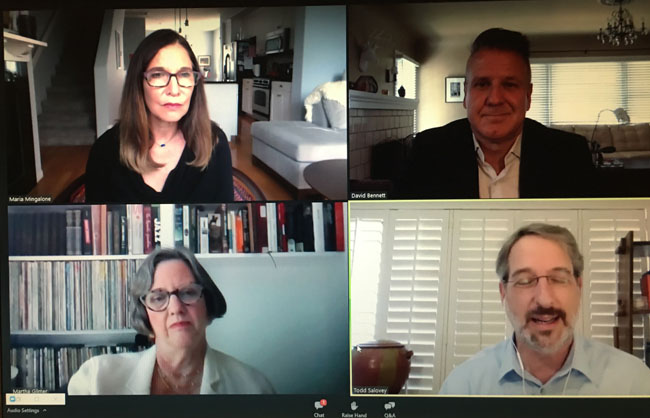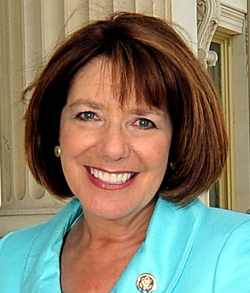

Other items in today’s column include:
*Camp Mountain Chai staff positions eliminated
*Susan Davis among Jewish Democrats signing anti-annexation letter
*Recommended reading

SAN DIEGO — During the time of coronavirus pandemic, the people can’t go to theatre, symphonic, or opera performances, or even to an art museum because of the need for social distancing. So, instead, the performing and visual arts are coming to the people, via Zoom, Facebook, and other Internet channels. While art organizations are doing so, they are becoming increasingly innovative.
Such was the thrust of a Jewish Community Foundation’s online conversation on Thursday that was moderated by Todd Salovey, associate director of the San Diego Repertory Theatre, with panelists Martha Gilmer, chief executive officer of the San Diego Symphony; David Bennett, general director of the San Diego Opera, and Maria Mingalone, executive director of the Oceanside Museum of Art.
The onset of the coronavirus, with government-ordered shut-downs and self-quarantines for non-essential workers, initially caught the arts organizations by surprise; Mingalone stating that as the museum’s top administrator she felt she was “flying the plane while building it.” Bennett said the San Diego Opera had to develop a whole new rhythm to its operations. Whereas pre-coronavirus, all efforts focused on the next opera production, now the company had to find new ways for its personnel to work together. Gilmer said with some 80 members of the orchestra, plus a staff of over 60, her main worry was how to help them sustain thems in a collapsing economy.
Eventually, new ideas took hold. The Oceanside Museum of Arts began holding over the Internet panel discussions with artists. It took Internet viewers on studio tours, and in the process “we were able to go deeper into content.” Programs that might have attracted 75 people to the museum more than doubled in attendance via virtual technology. The San Diego Opera held a “hackathon” with high-tech experts from such major companies as Google — an “ideation seminar,” Bennett called it. Among ideas was one in which a conductor’s signal for a downbeat could be transmitted simultaneously to musicians playing at separate locations.
For the San Diego Symphony, one innovation was to focus on the work and lives of individuals in the orchestra, Gilmer said. For example, Erin Douglas Dowrey was shown in a video segment playing Bach on a marimba. Other musicians were introduced similarly, she said. Meanwhile, she added, “The Shell,” the outdoor performance venue near the downtown Convention Center, has been undergoing construction, with the hope that it will be completed by the end of August.
For musicians, it has been difficult not being able to play together in the same physical space, Gilmer said. The symphony’s music director, Rafael Payare, has it very difficult from a creative standpoint. “A conductor without an orchestra can’t make a sound,” she added.
When the pandemic finally subsides, what changes will it have wrought? Salovey inquired.
For the Oceanside Museum of Art, it will be relatively easy to “space people out” and to implement protocols for cleaning common spaces, said Mingalone. Bennett said the opera may explore “alternative venues” for productions, including the outdoors. Gilmer said where musicians are placed during performances is being closely studied by the University of Colorado at Boulder. Relatively small audiences in large venues such as Petco Park are under consideration, with protocols for staggered entrances; touchless ticketing, and shorter concerts (to cut down on the need for bathroom time) all are possible ideas.
*
Camp Mountain Chai staff positions eliminated
Camp Mountain Chai, the San Diego Jewish-community sponsored camp in the San Bernardino Mountains, “will not hear the voices of our children singing Shabbat songs echoing across the mountain or seeing joyous hugs from reunited friends,” David Bark and Buddy Voit, respectively the board president and executive director, sadly messaged.
Not only summer camping is impacted, they said. “Based on guidance from state and local health departments, we expect that it will be months before we are able to gather again in-person in large numbers. As a result, we are suspending all in-person programs on our camp property until Spring 2021.”
Without the revenue that normal programming would earn, they said, “we were sadly unable to avoid the necessity of eliminating staff positions at Alpine Meadows Retreat Center, July 1st. These long term staff represent more than 50 years of service to our community. Staff were offered a severance payment in recognition of their length of service. we also received support from the San Diego Jewish Community COVID-19 Emergency Fund to provide additional benefits coverage.”
Other members of the Camp Mountain Chai team will be furloughed, the officials said.
*
Susan Davis among Jewish Democrats signing anti-annexation letter

Congresswoman Susan Davis (D-San Diego) is among 19 Jewish Democrats whose names are listed in a letter opposing Israel’s Prime Minister Benjamin Netanyahu’s plan to go forward with “annexing,” or extending Israeli civil law, to Jewish communities in Judea and Samaria.
Other Jews who were counted among 189 House Democrats opposing the move included David Cicilline of Rhode Island; Stephen Cohen of Tennessee; Ted Deutch of Florida, Lois Frankel of Florida; Andy Levin of Michigan; Alan Lowenthal of California; Nita Lowey of New York; Jerrold Nadler of New York; Dean Phillips of Minnesota; Jamie Raskin of Maryland; Jan Schakowsky of Illinois; Adam Schiff of California; Brad Schneider of Illinois; Kim Schrier of Washington; Melissa Slotkin of Minnesota; Debbie Wasserman-Schultz of Florida; Susan Wild of Minnesota; and John Yarmuth of Kentucky.
Among members of Congress from San Diego County, the letter also was signed by Democratic Reps. Mike Levin and Scott Peters. Congressman Juan Vargas was not listed as a signer.
The letter to Netanyahu and other members of the Israeli government reads as follows:
“We write as American lawmakers who are long-time supporters, based on our shared democratic values and strategic interests, of Israel and the U.S.-Israel relationship. We firmly believe in, and advocate for, a strong and secure Jewish and democratic State of Israel, a state able to build upon current peace treaties and expand cooperation with regional players and the international community. We have consistently endorsed the pursuit of a negotiated peace agreement between Israel and the Palestinians resulting in two states for two peoples and a brighter future for the Israeli people and the Palestinian people. In that vein, we write today to express our deep concern that the push for unilateral annexation of territory in the West Bank after July 1st will make these goals harder to achieve.
“Longstanding, bipartisan U.S. foreign policy supports direct negotiations to achieve a viable two-state solution that addresses the aspirations of both Israelis and Palestinians, and their desire for long-term security and a just, sustainable peace. This position was twice reconfirmed by the U.S. House of Representatives last year. Our fear is that unilateral actions, taken by either side, will push the parties further from negotiations and the possibility of a final, negotiated agreement.
“We remain steadfast in our belief that pursuing two states for two peoples is essential to ensuring a secure, Jewish, democratic Israel able to live side-by-side, in peace and mutual recognition, with an independent, viable, de-militarized Palestinian state.
“Unilateral annexation would likely jeopardize Israel’s significant progress on normalization with Arab states at a time when closer cooperation can contribute to countering shared threats. Unilateral annexation risks insecurity in Jordan, with serious ancillary risks to Israel. Finally, unilateral annexation could create serious problems for Israel with its European friends and other partners around the world. We do not see how any of these acute risks serve the long-term interest of a strong, secure Israel.
“As committed partners in supporting and protecting the special U.S.-Israel relationship, we express our deep concern with the stated intention to move ahead with any unilateral annexation of West Bank territory, and we urge your government to reconsider plans to do so.”
*
Israel travel opportunities
MASA Israel Journey, which facilitates study abroad and other long stays in Israel, has had to deal with severe budget cuts, yet has been making strides in fundraising to “provide as many people as possible meaningful, long term experiences in Israel,” according to Ofer Gutman, the organization’s acting CEO. The organization, funded both by the government of Israel and the Jewish Agency for Israel (JAFI) is accepting registrations for Israel experiences through the summer of 2021.
Nefesh b’ Nefesh, the organization that facilitates Jewish immigration to Israel, has announced that it has booked group space on 14 flights from New York to Tel Aviv and two from the West Coast to Israel during the months of July through September in response to 900 applications from Jews wanting to become Israeli citizens. Rabbi Yohoshua Fass, the organization’s executive director, commented, “It is incredible to witness and take part in this moment, where there is an unparalleled increase in Aliyah demand. With hundreds of seats now available for Olim (new immigrants), we look forward to taking a large step forward to ensuring that we can assist in the fruition of these Aliyah dreams.” More information is available via this website.
*
Recommended reading
*Prof. Peter C. Herman, writing in Times of San Diego, says in its drive to promote racial justice, San Diego State University is crossing over the line of academic freedom.
*
Donald H. Harrison is editor of San Diego Jewish World. He may be contacted via donald.harrison@sdjewishworld.com